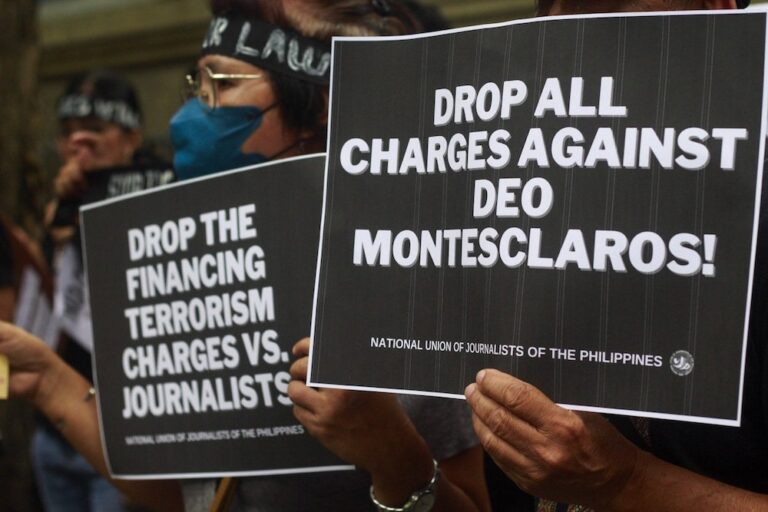(CMFR/IFEX) – More than 20 petitions have been filed by various organizations and individuals before the Supreme Court (SC) questioning the constitutionality of the anti-terror law. The Human Security Act (HSA) or Republic Act 9372, was signed into law in March 2007. The petitions are asking for a temporary restraining order (TRO) on its implementation. […]
(CMFR/IFEX) – More than 20 petitions have been filed by various organizations and individuals before the Supreme Court (SC) questioning the constitutionality of the anti-terror law.
The Human Security Act (HSA) or Republic Act 9372, was signed into law in March 2007. The petitions are asking for a temporary restraining order (TRO) on its implementation.
The SC has deferred a decision, and has ordered President Gloria Macapagal Arroyo and other respondents to comment on the petition.
The HSA was signed into law in Malacañang, where the Philippine President holds office, on 6 March. It went into effect on 15 July, amid criticisms that the government has yet to issue implementing rules and regulations (IRR).
Adding to widespread reservations over its constitutionality, Justice Secretary Raul Gonzalez told reporters in July that the HSA permits the wiretapping of media practitioners suspected of involvement in terrorism.
Martin Scheinin, United Nations Special Rapporteur for Human Rights and Counter Terrorism, said in a statement on 12 March that “many provisions of the Human Security Act are not in accordance with international human rights standards.” He then urged the Philippine government to amend, if not repeal, the law.
The law has also been criticized for its broad definition of terrorism as anything that instils widespread fear, and for making ordinary crimes like arson and rebellion terrorist acts if they meet the definition.
Aside from Arroyo, other respondents named in the petitions are the members of the Anti-Terrorism Council created by the HAS; namely, its chair, Executive Secretary Eduardo Ermita; Justice Secretary Raul Gonzales; Foreign Affairs Secretary Alberto Romulo; Acting Defense Secretary and National Security Adviser Norberto Gonzale; Interior Secretary Ronaldo Puno; and Finance Secretary Margarito Teves, Inquirer.net reported.
Also named respondents are the National Intelligence Coordinating Agency, the National Bureau of Investigation, Bureau of Immigration, Office of Civil Defense, the Intelligence Service of the Armed Forces of the Philippines, the Anti-Money Laundering Council, the Philippine Center for Transnational Crime, Philippine National Police Director General Oscar Calderon and AFP chief of staff General Hermogenes Esperon Jr.
Justice Secretary Raul Gonzalez said that the public should first test the effectiveness of the law before seeking its amendment.
“Until we can test the effectiveness of the law, I don’t think it’s wise for us to talk about amending it. Therefore, let us wait for the full implementation of the law, then find out whether there is ground for the criticism that right now is being announced,” Gonzalez said.
Human rights and lawyers’ groups, however, say the law is flawed and likely to lead to human rights abuses once implemented.


